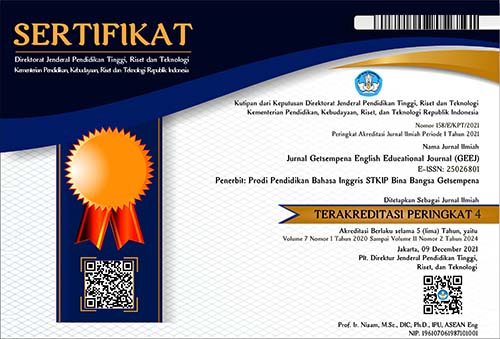THE USE OF WHISPERING TEAM TO ENHANCE STUDENTS’ LISTENING SKILL AT GRADE 6th OF KLASAMAN 2 ELEMENTARY SCHOOL SORONG CITY
Abstract
The aim of this journal is to enhance students’ listening skill especially the students of grade 6thof Klasaman 2 Elementary School, Sorong City, West Papua Province. The model of the research is Classroom Action Research (CAR). The researcher used test in cycles and observation sheet to due the data. The result of the data is 61% students succeed to execute the exercises in second cycle. Meanwhile, the students need more thing to help the students for example picture. The picture helped the students to remind the sentences they heard from the latest whispering person. The mean of scores in cycle 1 is 56.25 from 100 and cycle 2 is 87.5 from 100. Moreover, the students also learn character value by this game, they learnt to give appreciation for their friends whether they were succeed or failed. This game helped students to learn happily and fun.It can be proven by the observation sheet.The result and discussion of this study revealed that the implementation of whispering team game enhances students’ listening skill.The conclusion of this study revealed that the implementation of whispering team game enhances students’ listening skill.
References
Bonwell, C. C., &Eison, J. A. (1991). Active learning: Creating excitement in the classroom (ASHE-ERIC Higher Education Rep. No. 1). Washington, DC: The George Washington University, School of Education and Human Development.
Davies, B. and Ellison, L. (1992) School Development Planning. London: Longman.
Hackathorn, J., Solomon, E. D., Tennial, R. E., Garczynski, A. M., Blankmeyer, K., Gebhardt, K. & Anthony, J. N. (2010). You get out what you put in: Student engagement affects assessment. Poster presentation: Best Practices in Assessment Conference: Atlanta, GA
Hakim, M.A.R. (2015). “Experienced Efl Teachers’ Challenges and Strategies in Teaching Speaking for Introvert Students”, dalam European Journal of Social Science, 48 (4), 437-446.
Hakim, M.A.R & Dian.A. (2015). “Developing English Text Book For Fourth Grade StudentsinElementary School” dalam International Journal of Educational Studies, 12 (3), 29-35Hopkins, D. (1985). A teacher's guide to classroom research. Philadelphia: Open University Press.
John Dunloskyet al, (2013). Improving Students’ Learning With Effective Learning Techniques: Promising Directions From Cognitive and Educational Psychology.
Kemmis, S., &McTaggart, R. (Eds.). (1990b). The action research reader. Victoria: Deakin University.
Ur, Penny. (1996). A Course in Language Teaching.Cambridge : Cambridge
Michel, N., Cater III, J. J., & Varela, O. (2009). Active versus passive teaching styles: An empirical study of student outcomes. Human Resource Development Quarterly, 20(4), 397-418
Santrock, J.W. (2007). Child Development,Taxas: McGraw-HillUr, Penny. (1996). A Course in Language Teaching.Cambridge : Cambridge
Santrock, J.W. (2014). Educational Psychology. New York: McGraw Hill
Slameto.(1991). Proses Belajar Mengajar Dalam Sistem Kredit Semester. Jakarta: BumiAksara.
Suyanto, K.K.E. (2008). English For Young Learners.BumiAksara: Jakarta.
























